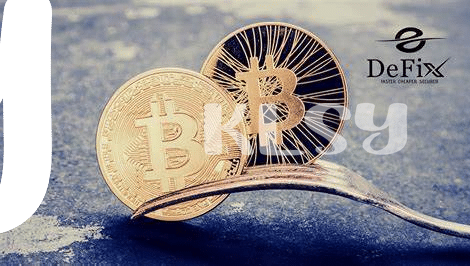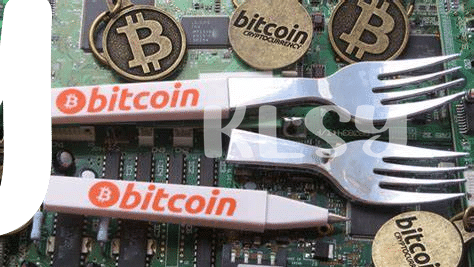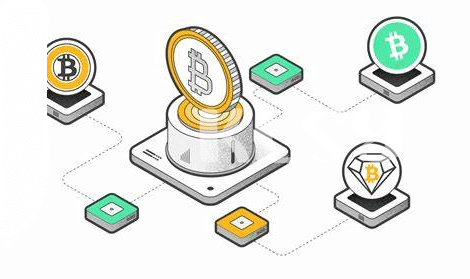What Are Bitcoin Forks? Exploring the Basics 🍴

Imagine journeying down a path and reaching a spot where it splits into two directions. You’re faced with a choice: go left or right. Each path offers a unique adventure, much like when changes are made in Bitcoin’s code, creating two separate versions. This process is known as a “fork.” Just like in our path analogy, these forks in the Bitcoin world result in versions that share a common history up to the point where the path divided. From there, they embark on their own separate journeys.
Forks happen for various reasons, often boiling down to disagreements within the community on how the Bitcoin network should evolve. Imagine a group of friends trying to decide on a movie: some might want a comedy, others a drama. In the world of Bitcoin, when no consensus is reached, a fork occurs, leading to the creation of a new coin. This event isn’t just a simple disagreement; it’s a pivotal moment that has led to the birth of new currencies, each with its own set of rules, features, and communities. To give you an idea of how these forks vary, here’s a quick comparison table of two major types:
| Type of Fork | Characteristics | Impact on Bitcoin |
|---|---|---|
| Soft Fork | Minor updates; compatible with older versions. | Generally adds features without creating a new currency. |
| Hard Fork | Significant changes; not compatible with older versions. | Can result in the creation of a new Bitcoin currency. |
The Tale of Two Forks: Soft Vs Hard 🤼
In the world of Bitcoin, changes come in two big flavors: soft forks and hard forks. Imagine you’re part of a club that follows a set of rules. A soft fork is like a slight rule update that the majority can decide to follow, without forcing everyone to agree. It’s compatible with the old rules, so even if some members don’t update, they can still play together. On the other hand, a hard fork is like creating a new club with new rules. Those who want to be part of it must fully accept the new regulations, creating a separate, distinct group from the original. This split can happen for various reasons, such as disagreements on how to improve the club’s operations or adding new features that the current rulebook can’t support.
Understanding these forks is crucial for anyone involved in Bitcoin, as they directly influence the direction and development of the currency. While soft forks aim for a smooth transition with minimal disruption, hard forks offer a clear but definitive choice, leading to the creation of entirely new currencies like Bitcoin Cash. Both types of forks represent the Bitcoin community’s attempts to evolve and adapt in the fast-paced world of cryptocurrency, showcasing the decentralized, democratic process at the heart of blockchain technology. With each fork, be it soft or hard, Bitcoin becomes more refined, responding to its users’ needs and the technological landscape.
Why Do Forks Happen? Reasons and Reactions 🌩

Imagine you’re going on a road trip with your friends, but halfway through, you disagree on which route to take. Some want the scenic path, others the fastest one. This is a lot like why Bitcoin forks happen: the Bitcoin community disagrees on the best direction for the currency. Reasons can range from improving security 🛡, adding new features, or solving problems like transaction speeds 🏎 and costs 💵. When these disagreements reach a standstill, a fork occurs, giving birth to a new ‘version’ of Bitcoin that embarks on a different path, while the original continues on its pre-set journey. The reactions can vary widely—from excitement at the potential of a new, improved Bitcoin to skepticism about dividing the community and diluting the brand. Yet, every fork, whether greeted with cheers or groans, sparks conversations and pushes the boundaries of what Bitcoin can be, shaping its evolution in the ever-changing landscape of cryptocurrency.
Bitcoin Forks Gone Famous: Bitcoin Cash and Others 💸

Among the ripples Bitcoin has created in the vast ocean of cryptocurrency, certain waves have made more splash than others, and these are known as forks. Imagine Bitcoin as a main road, and at various points, it splits into different paths, each leading to new possibilities and adventures. That’s exactly what happened with Bitcoin Cash, one of the most well-known forks, which emerged from a desire to increase the transaction capacity of Bitcoin. It was like opening a new lane on our crypto highway to make room for more traffic. But Bitcoin Cash isn’t the lone traveler on this journey. Other forks, like Bitcoin Gold, sought to democratize mining by making it possible for more people to participate, not just those with powerful, specialized equipment. These forks, each with their unique features and communities, contribute to the dynamic and ever-evolving Bitcoin ecosystem. They test new ideas and solutions, showing us that innovation is at the heart of cryptocurrency’s evolution. For those curious about diving deeper into the technicalities of Bitcoin and its intriguing relationship with modern technologies like quantum computing, a highly recommended read is bitcoin and quantum computing for beginners. This resource perfectly encapsulates the essence and potential tax advantages of involving oneself in the Bitcoin adventure, offering a beacon of knowledge in the sprawling sea of cryptocurrency information.
How Forks Influence the Bitcoin Ecosystem 🌐
Bitcoin forks, much like the branching of a tree, bring about diversity and adaptability within the cryptocurrency ecosystem. Imagine walking through a bustling marketplace – each stall offers something different yet contributes to the overall vibrancy and experience. Similarly, when a new fork emerges, it’s akin to a new stall setting up shop, offering alternatives and attracting its own set of enthusiasts. These forks, whether introducing improvements to Bitcoin’s existing framework or providing entirely new features, encourage ongoing innovation and healthy competition. They push developers to continuously refine and enhance their projects, ensuring that the cryptocurrency space is always on the cutting-edge of technological advancements.
| Fork Name | Type | Impact on Ecosystem |
|---|---|---|
| Bitcoin Cash | Hard Fork | Introduced increased block size, allowing for more transactions per block |
| Bitcoin Gold | Hard Fork | Democratized mining by employing a new proof-of-work algorithm |
| SegWit | Soft Fork | Enhanced the block size limit and mitigated transaction malleability issues |
Moreover, forks are not just technical diversions; they resonate deeply within the community, sparking debates, discussions, and sometimes even divisions about the future direction of Bitcoin. 🌐🚀💬 These discussions are crucial as they reflect the vibrant democracy inherent to the cryptocurrency world, where everyone has a say in its evolution. It’s this very dynamism, fueled by forks, that ensures the Bitcoin ecosystem remains robust, resilient, and ever-evolving, ready to meet the needs of its global user base.
Looking Ahead: What Future Forks Could Bring 🚀

As we venture into the future, the potential for new Bitcoin forks brings a mix of excitement and uncertainty within the crypto community. Imagine adding new colors to an already vibrant painting, where each brushstroke enhances the masterpiece’s value and appeal. In that sense, future forks could introduce innovative features, stronger security protocols, and more scalable solutions, potentially leading to a wider acceptance and use of Bitcoin. These innovations might not only make transactions faster and more efficient but could also open doors for new users who are looking for user-friendly and secure ways to enter the world of cryptocurrency.
Moreover, by diving into bitcoin philanthropy for beginners, newcomers can grasp the essence of Bitcoin’s community spirit and understand the impactful role of forks in shaping its evolution. As we look ahead, the possibility of forks might bring challenges, such as debates within the community and the need for consensus. Yet, it’s this very process of navigating through disagreements and finding common ground that has the power to strengthen the Bitcoin ecosystem, making it more robust, inclusive, and innovative. In a world that’s rapidly changing, the adaptability and growth brought about by future forks could very well be the fuel that drives Bitcoin’s journey to new heights.
